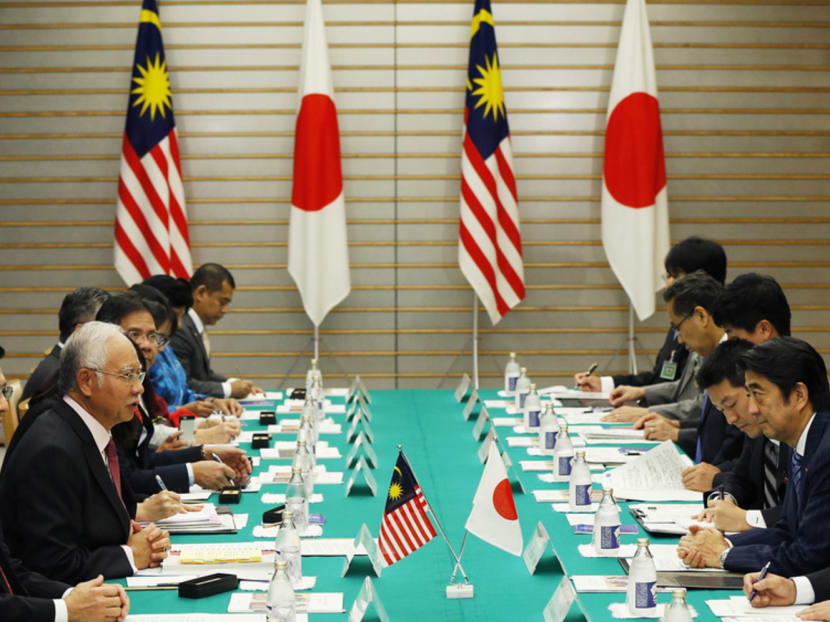With eyes on China, M’sia, Japan boost defence cooperation
TOKYO — Malaysia and Japan yesterday elevated their bilateral ties to a “strategic partnership” following talks between prime ministers Najib Razak and Shinzo Abe, where both sides also agreed to increase cooperation in maritime security and the transfer of defence equipment and technology amid China’s muscle-flexing in the region.

Mr Najib Razak (second from left) in talks with Mr Shinzo Abe (right) in Tokyo yesterday. The Malaysian PM said they spent a lot of time discussing if the Singapore-Kuala Lumpur high-speed rail link project would use shinkansen bullet-train technology. Photo: Reuters
TOKYO — Malaysia and Japan yesterday elevated their bilateral ties to a “strategic partnership” following talks between prime ministers Najib Razak and Shinzo Abe, where both sides also agreed to increase cooperation in maritime security and the transfer of defence equipment and technology amid China’s muscle-flexing in the region.
“We have decided to raise the relationship to a Strategic Partnership that we believe can lift the bilateral ties to a greater height,” Mr Najib said at a joint press conference with Mr Abe after their meeting at the Prime Minister’s Office in Tokyo.
Both leaders yesterday launched negotiations for the cooperation on the transfer of defence equipment and technology, marking the first time that Japan has agreed to start such negotiations with a member of the 10-nation Association of South-east Asian Nations (ASEAN), Japanese officials said.
However, no deal was reached on the Singapore-Kuala Lumpur high-speed rail link, for which the Japanese leader pitched his nation’s shinkansen bullet-train technology.
Mr Abe “expressed his hope” that the project would adopt the bullet-train system, while Mr Najib “expressed his appreciation for the technology and reliability of shinkansen and noted the interest of Japan”, according to a joint statement released after the meeting.
Mr Najib concludes his three-day visit to the country today, and will cap off the trip by taking a ride on a shinkansen line from Tokyo to Sendai in north-eastern Japan. The 90-minute journey covers just over 320km, about the same distance as that between Kuala Lumpur and Singapore.
Earlier this month, Mr Najib and Singapore Prime Minister Lee Hsien Loong reaffirmed their countries’ commitment to making the high-speed rail project successful, but pushed back the initial 2020 completion deadline because of the project’s complexity. China, France, Germany and South Korea are also reportedly keen to participate in the Malaysia-Singapore project.
“I hope to see the shinkansen running on Malaysian land,” Mr Abe said at the joint press conference.
Mr Najib said they spent a lot of time discussing the project. “We realised the significance and importance attached to the project by Japan,” Mr Najib said, adding that he believed Japan would submit a highly competitive bid when the time comes.
In the joint statement, both Mr Najib and Mr Abe vowed to boost coordination in maritime security.
In the wake of China’s massive land reclamation in the disputed South China Sea, Mr Abe and Mr Najib yesterday urged China and other claimant states to “settle their maritime disputes and differences through peaceful means and in accordance with universally recognised principles of international law”, according to the joint statement.
The leaders “reaffirmed the importance of maintaining peace, stability, security and freedom of navigation in and overflight the South China Sea,” it said.
They called on ASEAN and China to achieve the “early establishment” of an “effective” code of conduct aimed at reducing territorial and maritime conflicts in the South China Sea.
Beijing claims nearly the whole South China Sea, an international shipping route and an area believed to have rich energy reserves and fishing grounds. Parts of the contested waters are also claimed by Brunei, Malaysia, the Philippines, Taiwan and Vietnam.
Mr Abe and Mr Najib also affirmed Japanese-Malaysian cooperation in the fight against terrorism, the reform of the United Nations Security Council, and negotiations for the 12-nation Trans-Pacific Partnership.
Given Malaysia’s role as ASEAN chair this year, Mr Abe also “expressed his full support” to Mr Najib as the 10-nation bloc is lowering barriers to the flow of people, goods and money to launch a more integrated economic community by the end of the year. AGENCIES






